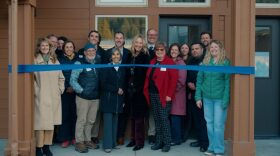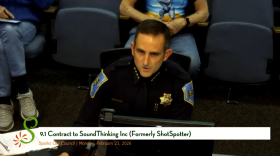Assemblymember David Orentlicher, AB150 sponsor, said it would close a major gap in protections for judges who often live outside of tribal lands and rely on local law enforcement.
”When you're a judge, you make decisions that many people are not going to like,” Orentlicher said. “The assumption probably was when people were writing these laws that judges for tribes can rely on their tribal lands, they have their own law enforcement.”
Orentlicher said that they never considered cases like Judge Patricia Lenzi who lives off-reservation and is the Chief Judge of the Winnemucca Indian Colony Tribal Court and Conflicts Judge for the Yerington Paiute Tribe in Nevada.
Lenzi testified in support of AB150 to the Nevada Assembly Judiciary Committee where she recounted events of being harassed.
“ I became the object of a campaign attempting to convince me to stop serving as judge, disqualify myself, abandon my work as a judge for that colony,” Lenzi said.
She described multiple social media posts sharing photos of her and her family, along with letters demanding she resign.
“ Letters were sent to each of my neighbors and their adult children by name at their respective addresses demanding the neighbors Hunt me down at the store where I work,” she said. “ The letters urged people, and I'm quoting, ‘to do whatever you have to do to stop her.’”
Lenzi was directed to report the incident to tribal police, even though it occurred off tribal lands in Douglas County.
She said no detective has investigated, leaving her with less protection than a private citizen due to local law enforcement’s jurisdictional confusion.
AB150 would make it illegal to threaten or intimidate a tribal judge in an attempt to influence their decision-making.
Penalties range from a category C felony for a first offense and category B felony for repeat offenses if physical force or threats of force are involved. If no force is used, the offense is classified as a gross misdemeanor.
The bill also seeks to expand assault and battery penalties for crimes against tribal judges. An assault without a deadly weapon would be considered a gross misdemeanor, while battery resulting in substantial bodily harm or strangulation is classified as a Category B felony, punishable by 2 to 10 years in prison and fines up to $10,000.
Additionally, AB150 would provide confidentiality protections for tribal judges allowing them to request that county recorders, assessors, and election officials keep their personal information private.
The bill would allow judges to ask the Department of Motor Vehicles to display an alternate address on their driver’s license or ID to enhance their safety.
These measures align tribal judges’ protections with those already granted to state and local judges.
Orentlicher said the issue has become more pressing with the growing use of video calls, such as Zoom, for court proceedings, and AB150 aims to close the gap.
“When someone assaults a judge, they’re not just attacking a person—they’re attacking our legal system,” Orentlicher said.






